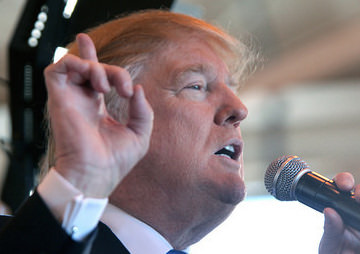Will Latinos Wall Off Trump?
How's this for poetic justice? Donald Trump's favorite scapegoats could end up having the satisfaction of blocking him from the White House. Donald Trump. (Gage Skidmore / CC BY-SA 2.0)
Donald Trump. (Gage Skidmore / CC BY-SA 2.0)
WASHINGTON — How’s this for poetic justice? Donald Trump’s favorite scapegoats could end up having the satisfaction of blocking him from the White House.
Latino voters have the potential to form a “big, beautiful wall” between Trump and his goal. If Trump gets the Republican nomination and Hispanics are provoked into voting in numbers that more nearly approach their percentage of the population — and if, as polls suggest, they vote overwhelmingly against Trump — it is hard to see how the bombastic billionaire could win.
Such an outcome would serve Trump right. Unfortunately for the GOP, it would also threaten to make Latinos a reliable and perhaps monolithic voting bloc for the Democratic Party, just as African-Americans have been since the 1960s. If this were to happen, simple arithmetic would make it increasingly difficult for Republicans to win the White House.
In 2012, Mitt Romney won just 27 percent of the Latino vote; his policy of “self-deportation” for undocumented immigrants is believed to have contributed to this poor showing. Following Romney’s defeat, a GOP postmortem called on the party to regain its footing with the nation’s largest minority group. “We must embrace and champion comprehensive immigration reform,” the report said.
This never happened. A group of senators who became known as the Gang of Eight, including Marco Rubio, managed to win passage of a reform bill, but House Republicans refused even to consider the legislation. It seemed the immigration issue would once again be a liability for the GOP in the presidential contest.
Then along came Trump, who opened his campaign by charging that immigrants coming from Mexico were criminals and rapists — and promising to build a wall along the border to keep them out. As for the 11 million undocumented immigrants already here, Trump’s solution is not self-deportation but rather forced deportation: He pledges to round them all up and send them home.
Trump may be all over the map on a host of issues, but xenophobic opposition to Latino immigration has been his North Star. He invites supporters to see their nation under siege from Latinos who allegedly take away jobs, commit crimes and alter traditional American culture. Last year, he criticized campaign rival Jeb Bush — whose wife is from Mexico — for speaking Spanish at a rally. “He should really set the example by speaking English while in the United States,” Trump said.
Trump’s chauvinism has been winning approval among the mostly white, working-class voters who form the core of his support. But there are signs that he may also be animating Latinos — to come out and vote against him.
A poll last month by The Washington Post and Univision showed that just 16 percent of Latino voters had a favorable view of Trump, as opposed to 80 percent who view him unfavorably. The remaining GOP candidates — Rubio, Ted Cruz and John Kasich — all do considerably better. But no Republican does nearly as well as Democrats Hillary Clinton and Bernie Sanders, both of whom are seen favorably by healthy majorities.
In a hypothetical matchup, according to the poll, Clinton would beat Trump among Latino voters by 73 percent to 16 percent. Assuming those who had no opinion went equally for the two candidates, Clinton’s share of the Latino vote would approach 80 percent. Swing states with large Hispanic populations such as Florida, Nevada, New Mexico and Colorado would effectively be off the table for the GOP.
Moreover, the sheer number of Latino voters will almost surely increase across the nation. According to the Pew Research Center, the 23.3 million Hispanics who were eligible to vote in 2012 will have grown to 27.3 million by this Election Day, mostly from young citizens who turn 18. The specter of a Trump presidency is giving urgency to widespread voter-registration drives.
Trump’s claim that he “won” among Hispanic voters in Nevada is based on entrance polling at the party caucuses, but the sample was so small as to be virtually meaningless. More pertinent is that more than twice as many Hispanics participated in the Democratic caucuses as in the Republican ones.
Assuming Trump wins the nomination, where does this leave him? If Latinos come out to vote against him in greater-than-usual numbers, he would have to win what looks like an impossibly high percentage of the white vote to be competitive. Even if the Latino vote just grows proportionally with population, he would have a hard time winning states that GOP presidential candidates can’t afford to lose.
He may wish he could say “I’m sorry” in Spanish.
Eugene Robinson’s email address is [email protected].
© 2016, Washington Post Writers Group
Your support matters…Independent journalism is under threat and overshadowed by heavily funded mainstream media.
You can help level the playing field. Become a member.
Your tax-deductible contribution keeps us digging beneath the headlines to give you thought-provoking, investigative reporting and analysis that unearths what's really happening- without compromise.
Give today to support our courageous, independent journalists.






You need to be a supporter to comment.
There are currently no responses to this article.
Be the first to respond.